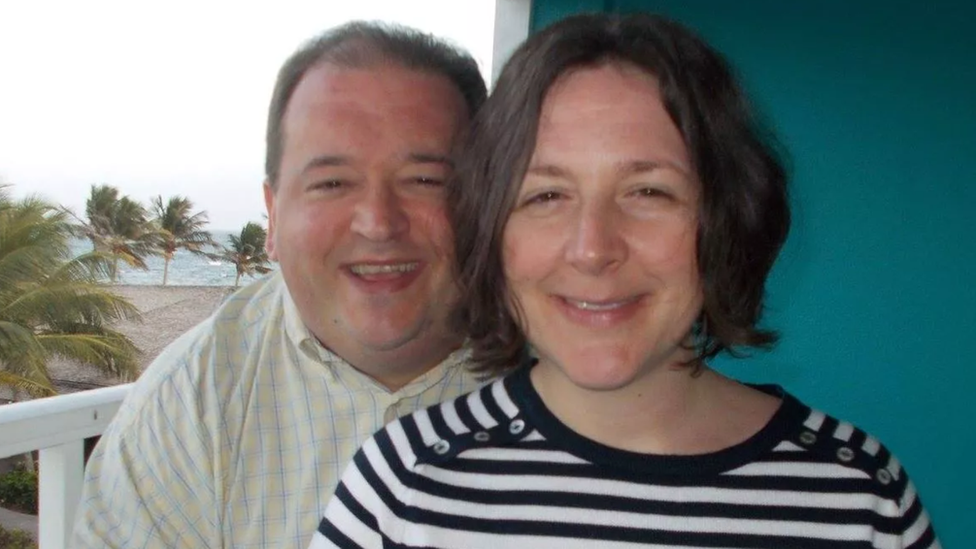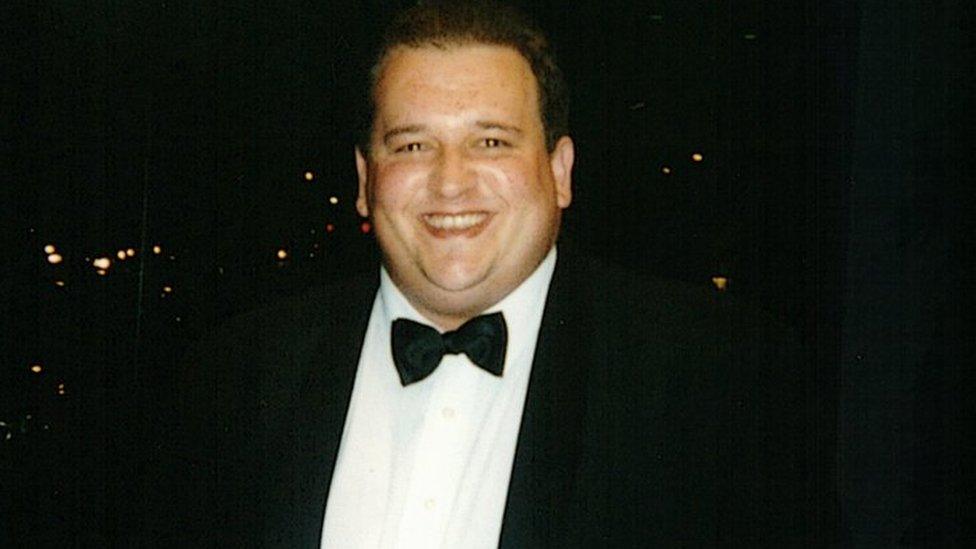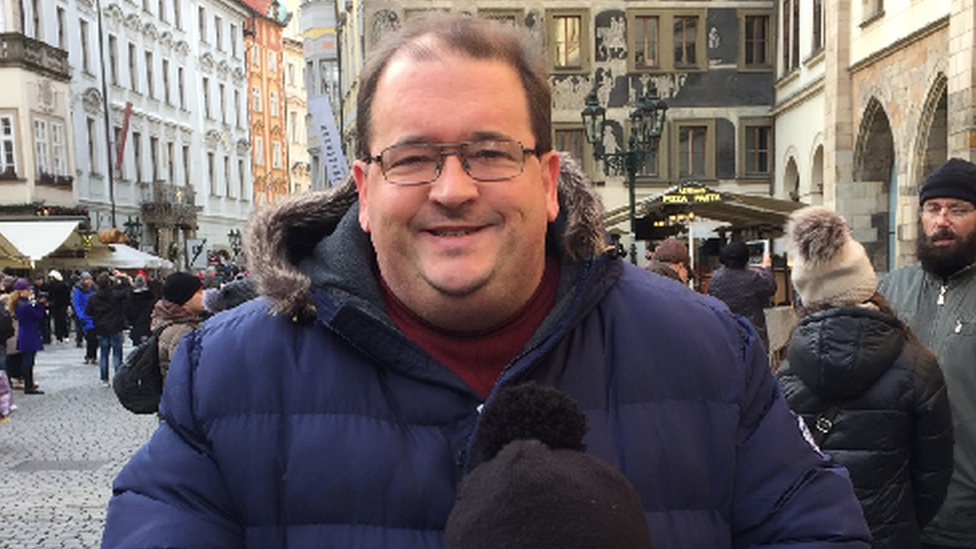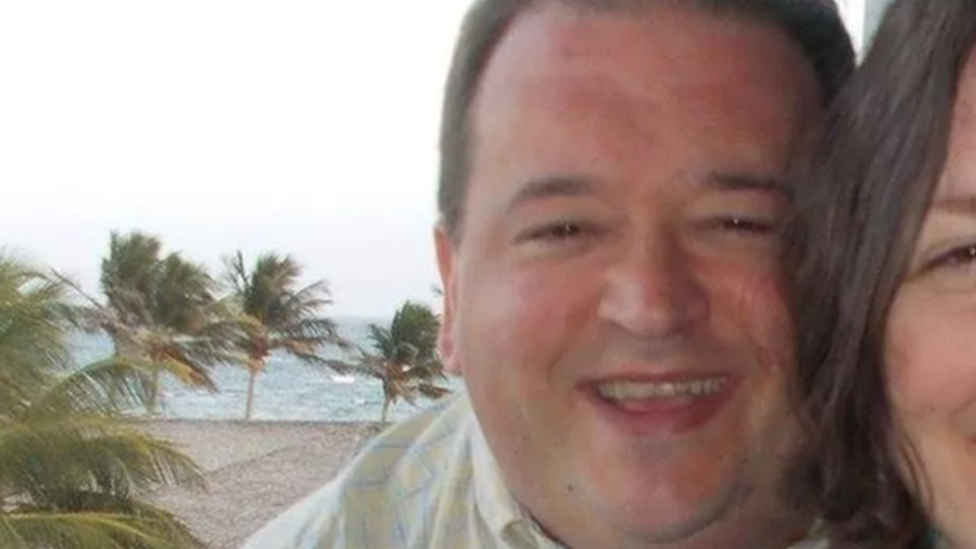Phillip Morris: Widow calls for greater transparency of private care
- Published

Dana Morris's husband Phil died after surgery in a private hospital
The widow of a man who died after weight-loss surgery has said greater transparency is needed when it comes to information about private care.
Dana Morris's husband, Phil, died following a cardiac arrest at the Spire St Anthony's Hospital, Surrey.
Mrs Morris said she wanted to ensure transparency so families can make "an informed decision" when it comes to private healthcare.
Spire Healthcare apologised for "the opportunities missed".
Mr Morris, originally from Newport, died in December 2021, four days after receiving sleeve gastrectomy surgery to remove part of his stomach.
A coroner concluded that he would probably have survived if a carbon dioxide monitor was working correctly.
Speaking to the BBC from the family home in Epsom, Surrey, Mrs Morris, 49, said there was a lack of transparency in some private hospitals when it came to care.
"The NHS is very open - online we can go to any hospital's website, and see information about the hospital, reviews from patients that have had care at that hospital," she said.
"That's not the same for private hospitals.
"I think that as part of somebody's research [into private care] there needs to be more of an openness about that hospital's track record, the surgeon's track record."
In a statement, Spire Healthcare said it offered its "very sincere and heartfelt condolences" to Mr Morris's family, and apologised for the "distress and pain" his death caused, "especially for the opportunities missed while he was in our care".
"Prior to the inquest, we carried out a thorough review of Mr Morris' treatment and have taken action to address the learnings we identified," they said.
"We accept the coroner's findings and will reflect on what further we can learn from this sad case."
It adds that the website for Spire St Anthony's includes, external information about the hospital's "good" Care Quality Commission (CQC) rating.
It also said that patient feedback about consultants was available on the Private Healthcare Information Network website and additional information could be found on the National Bariatric Surgery Register.
'I silently screamed'
Mrs Morris said her husband had been considering getting the surgery for "a long time", and that medical practitioners he had spoken to had supported him having it.
The aim was that "both the quality of life and quantity of life would hugely increase", she said.
Mrs Morris said although she had some concerns about the surgery, she was broadly supportive.
After the surgery Mr Morris developed "acute renal failure", the inquest at South London Coroner's Court found, and he was placed in the intensive care unit of the private hospital.
A decision was then taken to intubate him while waiting for a bed at the nearby St George's NHS hospital.
The procedure was found to be "extremely difficult" and the coroner, Sarah Ormond-Walshe, found his "airway was lost".
She found there was a "missed opportunity to succeed" while trying to create a new airway because a CO2 monitoring device was not working correctly.
She also found "no-one checked that this piece of equipment was working" because it was not any individual's responsibility to check.
A positive legacy
Mrs Morris also recalled the moment when she received a phone call from a staff member of the hospital telling her that her husband had died.
"I said, 'Is Phil OK?', and she went 'No, he's died'. I just could not believe it."
"I silently screamed, 'What?'" she said. "It felt like I'd fallen through the earth."
At the time, the couple's son, Orson, was asleep upstairs.
"As I was walking up the stairs, I thought 'What do I say?' So I just took a deep breath and spoke as softly as I could and said 'Orson, I'm so sorry, but dad has died'."
She said that Orson is receiving treatment for post-traumatic stress disorder, but he "has a wonderful store of memories to draw on".
"Each day I hear Orson speaking more and more of the happy times," she said.

Dana Morris said Phil was a "wonderful" husband
Mrs Morris also has positive memories of her husband, who she met at a camp in America. She described him as a "wonderful" husband.
"He gave me a belief in myself that even I didn't have," she said.
Mr Morris was a founding member of Wales Arts Review, serving as the managing director from 2012 to 2016, and his wife said she wanted to keep his passion for Welsh literature alive, describing him as a "force of nature".
The family have set up the PJ Morris Foundation in his name to help emerging writers from Wales, and have launched an award in his name.
"He was so full of energy, intellect. Absolutely hilarious as well," she said, describing him as having a "tremendous mind".
Related topics
- Published9 February 2024

- Published5 February 2024

- Published7 February 2024
